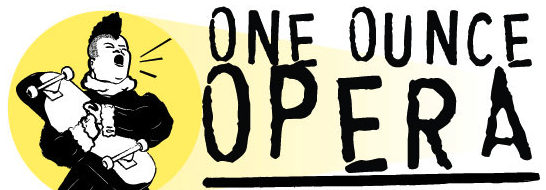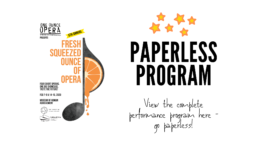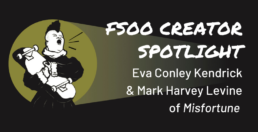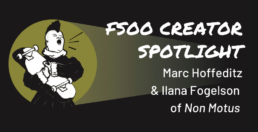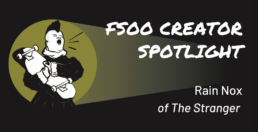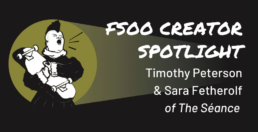FSOO Creator Spotlight: Eva Conley Kendrick & Mark Harvey Levine
Introducing the 5th Annual Fresh Squeezed Ounce of Opera showcase winners Eva Conley Kendrick (composer) and Mark Harvey Levine (librettist), creators of the micro-opera Misfortune, in its Regional Premiere.
FSOO 2020 admission and info here.
Performing and producing new works by living composers and librettists offers artists the opportunity for real-time communication. After spending time with the scores and their characters, cast members Maureen Broy Papovich, Jake Jacobsen and Julia Watkins-Davis had these questions for the creators:
What is your interpretation of what goes on in this story? Is there something supernatural at work here with these cookies? Were they meant for Barry?
Eva Conley Kendrick [ECK]: Mark will be the one to answer this but I like to think there is something supernatural at work here.
Mark Harvey Levine [MHL]: There is definitely something supernatural at work here — I always like a little touch of magic in my plays. As to the last question — well, that’s answered at the end.
Were you drawn to this story or inspired by it based on a personal experience?
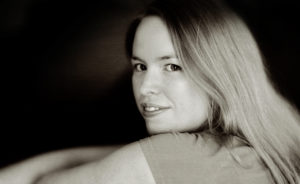
ECK: I have had many eerie coincidences occur in my life, and at least one has involved a fortune cookie. I did get the same fortune cookie two nights in a row at two different Chinese restaurants on two different sides of San Francisco, when I lived there. Possibly the most eerie coincidence occurred many years ago when my family and i were dropping my sister off at the Boston Amtrak at South Station to go seek her fortune as a cartoon animator on the TV show Animaniacs, where she’d just been hired. We discovered that our car had been towed. In my 14 year old despair I turned to my sister and said “I wish Paul S_____” was here. Paul was an opera singer I’d worked in the summer before and just happened to be the first person who came to my mind because he was the only person I knew who lived in Boston (actually, I discovered later he actually lived in Revere but worked in Boston). No sooner than the words were uttered, my sister and I looked up the road and there was Paul S_____ strolling towards us. He helped my parents locate the lot where our car had been towed to and he snuck us through the turnstile to get to the train with his pass which was helpful since my parents just had about enough money to get the car out of the lot. So Paul did save the day after all, and did I summon him with my words? Was it the biggest coincidence ever in a city with a population over 600K? Maybe…we’ll never know, just like the fortune cookie.
MHL: I’ve drawn from personal experience — I’ve eaten at a lot of Chinese restaurants. I love Chinese restaurants. Anything can happen at a Chinese restaurant.

The weirdest coincidence that ever happened to me ALSO took place in Boston. Why do these things always happen in Boston? I was visiting a friend there, and wanted to cross the street. As I stepped off the corner, I saw a vehicle coming out of the corner of my eye, so I jumped up back onto the curb so I wouldn’t get run over.
The vehicle was a hearse. A hearse with my name on it.
“Levine”, it said, in big letters on the side.
Question for Eva Conley Kendrick: I’ve always wondered how a composer goes about setting conversational texts. It seems so tricky!
ECK: In setting texts I think of the natural rhythm of the spoken phrase and also the dramatic intent behind the words. If I was setting a sentence of text to music and it was uttered as a question, a statement or an exclamation, I would set the sentence musically three different ways. The register—or the range of how high or low it would fall in the singers voice—also depends on the mood or dramatic intent. If someone is demanding something, for example, it would probably be lower and louder, more assertive, whereas if someone was wheedling, it would be higher and softer, just as it would be if it were spoken. I greatly enjoy writing recitative sections of music or the sung dialogue sections because it can transport a commonplace or intense conversation into an operatic world of sound.
Question for Mark Harvey Levine: I see that on your website, you are a playwright. How is writing a libretto different for you? It seems as though it would be a very different style.
MHL: I would think it would be a different style to write one, but Eva was incredibly generous. See, “Misfortune” is a ten minute play of mine. I thought she was going to ask for all sorts of changes, cuts and rewrites to turn it into an Opera. But no, she simply set it to her wonderful music, without asking me to change anything. I was very grateful.
Watch this preview with the cast of Misfortune!

FSOO Creator Spotlight: Marc Hoffeditz and Ilana Fogelson
Introducing the 5th Annual Fresh Squeezed Ounce of Opera showcase winners Marc Hoffeditz (composer) and Ilana Fogelson (librettist), creators of the micro-opera Non Motus, in its World Premiere. You may remember Marc’s short opera Ne’er Part I from the 2nd Annual Fresh Squeezed Ounce of Art Song concert (2017).
FSOO 2020 admission and info here.
Performing and producing new works by living composers and librettists offers artists the opportunity for real-time communication. After spending time with the scores and their characters, cast members Carmen Johnson, Allyssa Kemp, Cristina Flores, and Elise Leung Kotara had these questions for the creators (answered by both!):
Hannah is a nice comic relief to Non Motus. What was the inspiration behind the character?

We started the process of developing this piece by simply considering the kinds of individuals you might find stuck in traffic like this and what sort of specific (but ultimately universal) crises they might be experiencing. We’ve all been in the situation where basic human needs have become so intense that they overwhelm all the existential drowning we tend to do when we have nothing else to distract us. Hannah is all of us boiled down to our most fundamental level. We had no choice but to include her. In this way, despite her being the comic relief, we view Hannah as perhaps the most honest portrayal of the human condition in the opera. She is base human need, she doesn’t need a backstory, she doesn’t need a past trauma, all she needs to be is hyper-present in order to provide a sense of urgency and forward motion to the story.
In the car, Child seems frustrated with her mother because her mother isn’t present around her. Is this coming from a place where Child doesn’t feel validated or understood in their relationship and her mother is really like her grandmother? Or is Child just a pain in the butt because she can’t see anything that’s not black and white?
Child and her mother are a reflection of her mother and grandmother. Sure, she views the world through an adolescent lens, and perhaps that lens is more black and white and less inclined to acknowledge gray areas, but the real crux of the conflict between Child and her mother is ultimately this similarity between the two generational relationships. Child asks legitimate questions, but because she is a child and often repeats herself until she is understood or given what she views as a satisfactory answer, she is dismissed out of hand as nothing more than a nuisance. What we don’t know is whether this dismissal is common on the part of her mother, or if she is behaving this way because she is under an inordinate amount of stress. Is their relationship always this fraught or is there something about being on the highway heading toward the funeral that have turned it into something unusual?
Based on the dialogue, it seems that the Hannah/Gerry crash at the end actually occurs chronologically at the beginning of the opera. Can you share some insight into whether it’s a “Tarantino-style” setup where you start from the end and then work backwards”, or is it a Groundhog Day scenario where they really are all “stuck in a loop”?

You know, it could be viewed as either. What matters is that the characters feel as though they are stuck in a loop or in an inescapable stretch of life that is miserable, but also the best they’ve got. Whether time operates linearly or cyclically, the sentiment remains the same — the characters themselves feel as though they are going in circles.
The only speaking part for Deborah is when she is quoting/speaking for her mom. Is there a particular reason why you chose to have that spoken as opposed to sung and do you imagine a certain tone or timbre for the spoken sections?
Whenever I’m working on an opera, it’s always a challenge to balance the musical languages of multiple characters and simultaneous situations: Gerry sings the same cyclic motives ad nauseam, Child and Deborah switch between bouts of recitative and lyricism, and Hannah is full of ornaments and melismas. While the relationship between Deborah and her mother is reflected in the conversations with Child, I didn’t necessarily think that the grandmother needed to be intertwined into the harmonic language. She’s the only non-present character in the story and I think depending on how it is it interpreted, it could be rather jarring to have these brief bits of spoken text. In terms of a specific tone or timbre, I’d leave that up to the performers and creative team to decide how to they would like to portray those moments. Each performance of the opera so far has resulted in very different characterizations and it’s always fun to hear something new!
Watch this preview with the cast of Non Motus!

FSOO Creator Spotlight: Rain Nox
Introducing the 5th Annual Fresh Squeezed Ounce of Opera showcase winner Rain Nox, creator of the micro-opera The Stranger, in its World Premiere. You may remember Rain’s short opera Problems (2017) from the 2nd Annual FSOO.
FSOO 2020 admission and info here.
Performing and producing new works by living composers and librettists offers artists the opportunity for real-time communication. After spending time with the scores and their characters, cast members Cristina Flores, Andy Fleming, Dana Lewis, and Jake Jacobsen had these questions for the creator:
Delilah seems to be torn between wanting Melanie to be happy and thinking her new beau is a douchebag. Is this because she and Frampton think Melanie has an unhealthy pattern of prioritizing mediocre guys she dates, or because Frampton is possessive of Melanie and Delilah is easily manipulated because of her people pleasing nature? Is it more that Guy is mediocre or that the pets have a jealousy complex? I feel like they are going to try and terrorize anyone who might threaten to take away Melanie’s attention.
Rain Nox (RN): I’d like to leave the interpretation up to the audience and performers, but I will say Delilah is the more naïve of the two, so when faced with the negative outcomes Frampton suggests that makes her rethink her position. I have an awesome cat named Chance, and although he’s not quite a Frampton, he can be possessive, but I like to think he wants me to be happy. Even though he never wants me to work on music…
Melanie is written as such a three dimensional character. We get to know her so well within a short period of time. What is your process for creating and developing such vivid and rich characters?
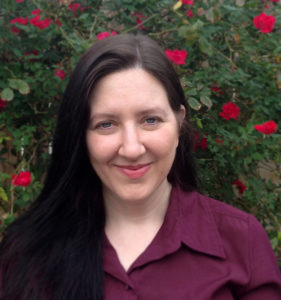
RN: I’m glad you feel that way! I always just knew who Melanie was from the very beginning of the project. I knew she was confident, caring, intelligent, and comfortable with her sexuality, but also struggling with societal expectations of not “having it all” because she doesn’t have a spouse and kids. I tried to use multiple methods of revealing her to the audience (having the animals talk about her, having her talk about herself, and allowing the audience to observe her interactions with the animals and Guy).
The act of taking an idea and following through to create a finished product is no easy task, especially with such a brilliant finished product like this micro opera! How do you stay committed and motivated to take action and write until you complete an entire piece like The Stranger
RN: Since I actually came up with the idea about a year and a half ago but didn’t write it until just before the submittal due date I’m probably not the best person to talk about this. I would say I am very deadline motivated. But there is a certain amount of in the background preparation that happens between when I come up with an idea and when I actually put pen to paper that is indispensable so I try to not be too hard on myself and accept that it is part of my process. Also, an opportunity for a performance by such a great group as One Ounce Opera is highly motivating!
The Stranger is written in movements, 6 in total. They seamlessly weave from one into the other to tell the story, yet each is its own moment. Why did you choose to write this micro opera in movements and how did composing and writing this way inform your creative process?
RN: This probably comes from my musical theatre influence, where there tends to be discrete songs with dialogue in between, only in opera the would be dialogue is part of the songs. For The Stranger, I thought a lot about how much stage time each character should have- for instance Guy has the least amount because he’s just “some guy”. I also thought about making the voice combinations (solo, duet, trio, quartet) varied to make it more interesting for the audience.
Watch this preview with the cast of The Stranger!
FSOO Creator Spotlight: Timothy Peterson and Sara Fetherolf
Introducing the 5th Annual Fresh Squeezed Ounce of Opera showcase winners Timothy Peterson and Sara Fetherolf, creators of the micro-opera The Seance, in its Texas Premiere.
Performing and producing new works by living composers and librettists offers artists the opportunity for real-time communication. After spending time with the scores and their characters, cast members Carol Brown, Jaimie Lowe, Carmen Johnson, Brian Minnick, and Julius Young had these questions for the creators:
What inspired the libretto? The text is pretty heavy.
Timothy Peterson, composer (TP): When New Opera Works invited Sara and me to compose this scene in 2018 for their showcase of premieres by students at the University of Southern California, we were given the parameter that it take place in one time and place. Sara had the idea of setting the scene as a seance both to satisfy this practical need and allow us to explore themes that interested us, such as our need to name and define things in order to understand and accept them, even when our vocabularies fail us. My first collaboration with Sara was a song cycle inspired by the Greek myth of Philomela, so we also have a shared interest in surreal and fantastic storylines!

Sara Fetherolf, librettist (SF): I was thinking a lot about the threat of anthropogenic climate change, and how the earth’s landscapes, animals, and peoples have been drastically affected by industrialization and colonization. Science can be both a blessing and a curse when it comes to climate change—scientists have identified the ways human activity is killing the planet, and they are working to mitigate the damage. Real scientists, I think, are full of humility and curiosity. Even so, a lot of the technologies that got us into this mess were a result of a toxic combination of imperialism and scientific hubris. I was interested in exploring these themes in the context of a séance, and to specifically riff on Mr. More’s “man of science” attitude, which I see as connected to his assumption that the dead—many of whom have never gotten to speak before—would behave as he wanted them to. I guess those are some pretty heavy themes!
We definitely feel the characters have a lot of back-story. How long ago the siblings’ mother die? After our first read through the opera, we thought that would be an influence in the plot, although maybe it isn’t. Is there something Mr. More is hoping the Medium — or the Dead — will say?
SF: I thought a lot about this—not because it directly affects the plot, but because I wanted believable and developed characters, even in this short scene. In my head, the backstory was that the More parents died when Katherine (Mrs. Foster) was very young, so she doesn’t remember them much. The Mores are old money, and she was raised by nannies and boarding schools. She’s grown up to be a practical, no-nonsense woman who is not particularly close to her brother. Mr. More, however, was a teenager when his parents died, and the grief of losing them—especially his mother—has made him crave explanations about death and the afterlife. Unfortunately, he thinks he can buy the answer instead of accepting the mystery. I think he wants a séance where he gets all the reassurances he needs from his dead loved ones.
But this is just one possible backstory! Ultimately, I wanted to leave it open enough that the audience and the performers could fill in the characters’ histories and motives for themselves.

Where did the inspiration for the personality of The Dead come from? It seems to be more than just the ghost of an Egyptian woman.
TP: When we think of our relationship to the dead, we often think of our lost loved ones. In the historical seances that inspired our scene, spiritualists were most interested in communicating with the spirits of those whom they knew personally. Sara and I were interested in exploring what it might mean if we viewed death as something that concerns more than humans in the present, especially our loved ones. What if we considered the deaths of strangers from the distant past and honored death as a phenomenon that affects the natural world as well, especially due to harmful human activity? In our scene, the Voice of the Dead represents this more expansive embodiment of death.
SF: Yes to all of that. Death is so much bigger than how we often think about it. It’s a natural process that allows for regeneration and new life, and it’s also an injustice that has been inflicted on people and living things that stand in the way of “human progress.” I imagined the Voice of the Dead as a composite of all the many plants, animals, and people who have died and are desperate to say something about it. They have finally been invited to speak to someone who has never bothered to consider their stories, and so they take the opportunity.
Timothy, we’re curious whose music influences your composition style the most. What composers inspire you?
TP: I’ve always loved the music of 20th-century French composers. Some of the music that I composed for the Voice of the Dead’s character was inspired by Milhaud’s L’Orestie d’Eschyle, especially his setting of Athena’s supernatural voice in harmony distributed among multiple voice parts. Living composers whose vocal music inspires me include Christopher Cerrone, Elliot Cole, Caroline Shaw, and Ellen Reid.
Watch a preview with the cast of Seance below!
